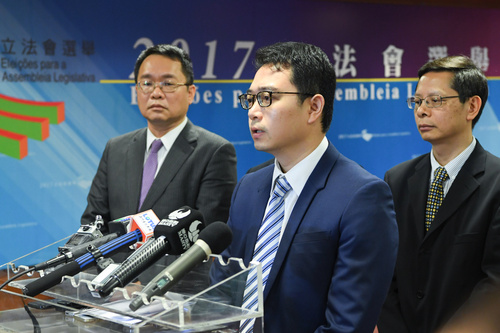 The Chairman of the Electoral Affairs Commission for the Legislative Assembly Election, Mr Tong Hio Fong, meets the press.
The Chairman of the Electoral Affairs Commission for the Legislative Assembly Election, Mr Tong Hio Fong, meets the press.
The Electoral Affairs Commission for the Legislative Assembly Election has finalised the designs for, respectively, the ballots and chops to be used in the election day, introducing some enhancements in order to minimise potential mistakes during voting.
The new ballots feature clearly marked boxes – with margins in blue colour as advised by experts consulted by the Commission – indicating where voters should affix the chop for their vote. In the new ballots, the boxes to affix the chop are located between the number of the candidate lists and their respective names.
The Chairman of the Commission, Mr Tong Hio Fong, today disclosed the information to reporters after a Commission meeting to discuss the design for the ballots.
Candidate lists will be ranked in numerical order in the ballot, as required by law, and will be ordered vertically. Information related to each team’s name will be displayed in the same line as their respective number, Mr Tong added.
A chop bearing a “check” mark will be used in the 2017 Legislative Assembly Election, similar to the previous election. Mr Tong advised voters to use only chops provided by the Commission; otherwise the ballots would be considered invalid.
The Secretariat of the Commission also met with three local associations representing blind and visually impaired people, in order to collect their opinions on the design of ballots. The Commission planned to use special equipment featuring raised numbers and holes to assist sight-impaired residents to vote independently, said Mr Tong.
Magnifiers would be available in all polling stations to assist voters with weak eyesight to vote independently. But the Commission planned to concentrate all blind and visually impaired voters in a special polling station in order to provide them with better support. Sight-impaired people that wished to vote in that special station – instead of the station allocated to them based on their residential address – should inform the Commission accordingly.
Mr Tong said that, according to preliminary data collected by the Commission, there were approximately 700 to 800 visually impaired people in Macao; the Commission would later do a study to estimate how many of these people were registered voters.
During today’s meeting, the Commission also discussed issues related to the spending of each campaigning team. Each team should submit to the Commission a detailed spending report – within 90 days after the election day – together with a confirmation letter issued by a Macao-registered accountant.
As of today, the Electoral Affairs Commission and the Commission Against Corruption (CCAC) had received two complaints relating to the election. The Electoral Affairs Commission would further liaise with CCAC to handle this matter. Mr Tong said he could not disclose further information at the moment, citing the confidentiality of complaints and in order to ensure a smooth investigation.
Regarding the request for a meeting by the Association of Portuguese and English Press in Macau to address enquiries regarding news coverage of the election, Mr Tong said the Commission was preparing a written reply to the Association.
Mr Tong stressed the Commission had great respect for the freedom of the press and said the freedom of reporting should not be limited.
When covering the election, local media outlets should comply with the law, which prohibits promotion of campaigning teams during the non-campaign period. The media enjoyed a great degree of freedom in news reporting, but at the same time should comply with legal regulations, said Mr Tong.
Mr Tong additionally said the Commission expected to complete the formulation of guidelines for the election within this month.
The Commission is to hold briefing sessions in mid- or late-April to offer interested persons and organisations a better understanding of the election process.


